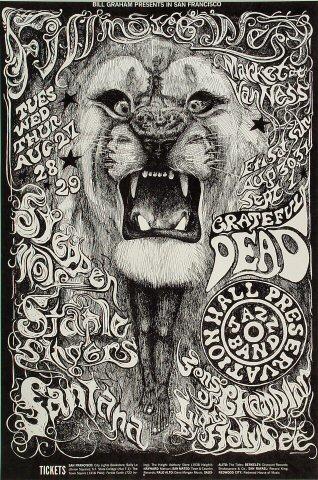Steppenwolf Poster

Image may not exactly match item shipped.
Santana was so taken with Lee Conklin's poster design that they asked the artist to redraw the picture for their first album cover, and the lion and Santana became permanently linked in aficionados' minds. Although Bill Graham preferred color posters to advertise his concerts, BG134 was so powerful in its original pen and ink it, was sent to press that way.
The 1st printing poster is on uncoated index and does not display a "W" after the ticket outlets strip as seen in the reprint. It measures 14 1/8" x 21 1/8" and was printed before the concert.
The 2nd printing is on slick glossy stock and has a white "W" etched into the poster at the end of the ticket outlets strip after the word "Music". It measures 14 1/8" x 21" and was printed after the concert.
In 1988, CBS/Sony reprinted the poster on thin uncoated index. A CBS/Sony Records logo is displayed in the lower left corner and "BG#134 reprinted 1988 by permission of Bill Graham Presents Archives / © B. Graham" in the lower right corner below the ticket outlet strip. This printing is much larger, measuring 13" x 19 1/2"".
The 4th printing is on smooth opaque cover stock and has a Wolfgang's Vault notation in the lower right hand margin. It was printed in 2016 by the Bill Graham Archives LLC in a 500 copy run. This reprint measures 14" X 20".
The 5th printing is on uncoated matte stock and has "W 2020" in the lower right hand margin. It was printed in 2020 by Wolfgang's in a 500 copy run. This reprint measures 14" x 19 1/2".
Lee Conklin's early influences were pen and ink masters Heinrich Kley and Saul Steinberg.After seeing articles featuring Wes Wilson's poster art, Conklin was inspired to visit San Francisco and show his art to Bill Graham. Conklin was soon commissioned to do posters and produced 31 original designs for the Fillmore between 1968 and 1969. Conklin rendered both graphics and calligraphy in intricate detail. What began as a personal challenge to disguise images within images and lettering soon turned into a concerted effort to turn every single letter and figure into another form, stretching the imagination to new limits.